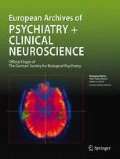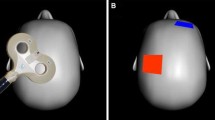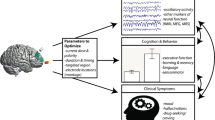Abstract
One out of four patients with a psychiatric disorder does not tolerate or sufficiently respond to standard treatments, leading to impaired quality of life, significant morbidity and mortality, as well as high socioeconomic costs. There is increasing evidence that—apart from psychopharmacologic and psychotherapeutic interventions—targeted modulation of neural networks by brain stimulation techniques might serve as a third treatment modality. In the whole spectrum of treatment modalities, combined approaches are often used for difficult-to-treat patients. They may be superior strategies compared to monotherapy and could possible also include brain stimulation interventions. However, systematic research is lacking for the latter issue. Particularly, noninvasive brain stimulation (NIBS), e.g., transcranial direct current stimulation (tDCS) can be easily combined with psychotherapy approaches. Here, we introduce NIBS techniques for priming and augmenting psychotherapy, review preliminary data and propose a future research strategy. Interestingly, this strategy parallels the promising development in neurology and neurorehabilitation where tDCS is currently combined with functional training tasks to enhance motor or cognitive performance.

Similar content being viewed by others
References
Abbass AA, Nowoweiski SJ, Bernier D, Tarzwell R, Beutel ME (2014) Review of psychodynamic psychotherapy neuroimaging studies. Psychother Psychosom 83(3):142–147
Bajbouj M, Heuser I (2009) Stimulating the brain to treat depression. Exp Neurol 219(1):1–59
Barch DM, Sheline YI, Csernansky JG, Snyder AZ (2003) Working memory and prefrontal cortex dysfunction: specificity to schizophrenia compared with major depression. Biol Psychiatry 53(5):376–384
Beauregard M (2014) Functional neuroimaging studies of the effects of psychotherapy. Dialogues Clin Neurosci 16(1):75–81
Berlim MT, Van den Eynde F, Daskalakis ZJ (2013) A systematic review and meta-analysis on the efficacy and acceptability of bilateral repetitive transcranial magnetic stimulation (rTMS) for treating major depression. Psychol Med 43(11):2245–2254
Berlim MT, van den Eynde F, Tovar-Perdomo S, Daskalakis ZJ (2014) Response, remission and drop-out rates following high-frequency repetitive transcranial magnetic stimulation (rTMS) for treating major depression: a systematic review and meta-analysis of randomized, double-blind and sham-controlled trials. Psychol Med 44(2):225–239
Brakemeier EL, Luborzewski A, Danker-Hopfe H, Kathmann N, Bajbouj M (2007) Positive predictors for antidepressive response to prefrontal repetitive transcranial stimulation (rTMS). J Psychiatr Res 41(5):395–403
Brakemeier EL, Merkl A, Wilbertz G, Quante A, Regen F, Bührsch N, van Hall F, Kischkel E, Danker-Hopfe H, Anghelescu I, Heuser I, Kathmann N, Bajbouj M (2014) Cognitive-behavioral therapy as continuation treatment to sustain response after electroconvulsive therapy in depression: a randomized controlled trial. Biol Psychiatry 76(3):194–202
Brakemeier EL, Wilbertz G, Rodax S, Danker-Hopfe H, Zinka B, Zwanzger P, Grossheinrich N, Várkuti B, Rupprecht R, Bajbouj M, Padberg F (2008) Patterns of response to repetitive transcranial magnetic stimulation (rTMS) in major depression: replication study in drug-free patients. J Affect Disord 108(1–2):59–70
Brunoni AR, Boggio PS, De Raedt R, Benseñor IM, Lotufo PA, Namur V, Valiengo LC, Vanderhasselt MA (2014) Cognitive control therapy and transcranial direct current stimulation for depression: a randomized, double-blinded, controlled trial. J Affect Disord 162:43–49
Brunoni AR, Valiengo L, Baccaro A, Zanao TA, de Oliveira JF, Goulart A, Boggio PS, Lotufo PA, Benseñor IM, Fregni F (2013) The sertraline vs electrical current therapy for treating depression clinical study: results from a factorial, randomized, controlled trial. JAMA Psychiatry 70:383–391
Brunoni AR, Zanao TA, Vanderhasselt MA, Valiengo L, de Oliveira JF, Boggio PS, Lotufo PA, Benseñor IM, Fregni F (2014) Enhancement of affective processing induced by bifrontal transcranial direct current stimulation in patients with major depression. Neuromodulation 17(2):138–142
Cattaneo Z, Vecchi T, Pascual-Leone A, Silvanto J (2009) Contrasting early visual cortical activation states causally involved in visual imagery and short-term memory. Eur J Neurosci 30(7):1393–1400
Cooper AC, Humphreys GW, Hulleman J, Praamstra P, Georgeson M (2004) Transcranial magnetic stimulation to right parietal cortex modifies the attentional blink. Exp Brain Res 155(1):24–29
Del Casale A, Ferracuti S, Rapinesi C, Serata D, Piccirilli M, Savoja V, Kotzalidis GD, Manfredi G, Angeletti G, Tatarelli R, Girardi P (2012) Functional neuroimaging in specific phobia. Psychiatry Res 202:181–197
Dieler AC, Dresler T, Joachim K, Deckert J, Herrmann MJ, Fallgatter AJ (2014) Can intermittent theta burst stimulation as add-on to psychotherapy improve nicotine abstinence? Results from a pilot study. Eur Addict Res 20(5):248–253
Downar J, Daskalakis ZJ (2013) New targets for rTMS in depression: a review of convergent evidence. Brain Stimul 6:231–240
Feeser M, Prehn K, Kazzer P, Mungee A, Bajbouj M (2014) Transcranial direct current stimulation enhances cognitive control during emotion regulation. Brain Stimul 7(1):105–112
Flöel A (2014) tDCS-enhanced motor and cognitive function in neurological diseases. Neuroimage 85(Pt 3):934–947
Funke K, Benali A (2011) Modulation of cortical inhibition by rTMS—findings obtained from animal models. J Physiol 589:4423–4435
Galea JM, Albert NB, Ditye T, Miall RC (2010) Disruption of the dorsolateral prefrontal cortex facilitates the consolidation of procedural skills. J Cogn Neurosci 22(6):1158–1164
George MS, Lisanby SH, Avery D, McDonald WM, Durkalski V, Pavlicova M, Anderson B, Nahas Z, Bulow P, Zarkowski P, Holtzheimer PE 3rd, Schwartz T, Sackeim HA (2010) Daily left prefrontal transcranial magnetic stimulation therapy for major depressive disorder: a sham-controlled randomized trial. Arch Gen Psychiatry 67:507–516
Gottesman II, Gould TD (2003) The endophenotype concept in psychiatry: etymology and strategic intentions. Am J Psychiatry 160(4):636–645
Grimm S, Luborzewski A, Schubert F, Merkl A, Kronenberg G, Colla M, Heuser I, Bajbouj M (2012) Region-specific glutamate changes in patients with unipolar depression. J Psychiatr Res 46(8):1059–1065
Grimm S, Weigand A, Kazzer P, Jacobs AM, Bajbouj M (2012) Neural mechanisms underlying the integration of emotion and working memory. Neuroimage 61(4):1188–1194
Guhn A, Dresler T, Andreatta M, Müller LD, Hahn T, Tupak SV, Polak T, Deckert J, Herrmann MJ (2014) Medial prefrontal cortex stimulation modulates the processing of conditioned fear. Front Behav Neurosci 8:44
Hamani C, Nobrega JN (2012) Preclinical studies modeling deep brain stimulation for depression. Biol Psychiatry 72:916–923
Hamilton R, Messing S, Chatterjee A (2011) Rethinking the thinking cap: ethics of neural enhancement using noninvasive brain stimulation. Neurology 76(2):187–193
Höflich A, Baldinger P, Savli M, Lanzenberger R, Kasper S (2012) Imaging treatment effects in depression. Rev Neurosci 23:227–252
Hoy KE, Fitzgerald PB (2010) Brain stimulation in psychiatry and its effects on cognition. Nat Rev Neurol 6(5):267–275
Hwang JH, Kim SH, Park CS, Bang SA, Kim SE (2010) Acute high-frequency rTMS of the left dorsolateral prefrontal cortex and attentional control in healthy young men. Brain Res 1329:152–158
Keller MB, Klerman GL, Lavori PW, Coryell W, Endicott J, Taylor J (1984) Long-term outcome of episodes of major depression: clinical and public health significance. JAMA 252:788–792
Kirschen MP, Davis-Ratner MS, Jerde TE, Schraedley-Desmond P, Desmond JE (2006) Enhancement of phonological memory following transcranial magnetic stimulation (TMS). Behav Neurol 17(3–4):187–194
Langhorne P, Bernhardt J, Kwakkel G (2011) Stroke rehabilitation. Lancet 377(9778):1693–1702
Leeman RF, Bogart D, Fucito LM, Boettiger CA (2014) “Killing Two Birds with One Stone”: alcohol use reduction interventions with potential efficacy in enhancing self-control. Curr Addict Rep 1(1):41–52
Lett TA, Voineskos AN, Kennedy JL, Levine B, Daskalakis ZJ (2014) Treating working memory deficits in schizophrenia: a review of the neurobiology. Biol Psychiatry 75(5):361–370
Levkovitz et al. (2013) submitted [FDA approval 2013: www.accessdata.fda.gov/cdrh_docs/…/k122288.pdf]
Lisanby SH (2007) Electroconvulsive therapy for depression. N Engl J Med 357:1939–1945
Lozano AM, Giacobbe P, Hamani C, Rizvi SJ, Kennedy SH, Kolivakis TT, Debonnel G, Sadikot AF, Lam RW, Howard AK, Ilcewicz-Klimek M, Honey CR, Mayberg HS (2012) A multicenter pilot study of subcallosal cingulate area deep brain stimulation for treatment-resistant depression. J Neurosurg 116:315–322
Luber B, Kinnunen LH, Rakitin BC, Ellsasser R, Stern Y, Lisanby SH (2007) Facilitation of performance in a working memory task with rTMS stimulation of the precuneus: frequency- and time-dependent effects. Brain Res 1128(1):120–129
Luber B, Lisanby SH (2014) Enhancement of human cognitive performance using transcranial magnetic stimulation (TMS). Neuroimage 85 Pt 3:961–970
Malone DA Jr, Dougherty DD, Rezai AR, Carpenter LL, Friehs GM, Eskandar EN, Rauch SL, Rasmussen SA, Machado AG, Kubu CS, Tyrka AR, Price LH, Stypulkowski PH, Giftakis JE, Rise MT, Malloy PF, Salloway SP, Greenberg BD (2009) Deep brain stimulation of the ventral capsule/ventral striatum for treatment-resistant depression. Biol Psychiatry 65:267–275
Maren S, Phan KL, Liberzon I (2013) The contextual brain: implications for fear conditioning, extinction and psychopathology. Nat Rev Neurosci 14:417–428
Merkl A, Schneider GH, Schönecker T, Aust S, Kühl KP, Kupsch A, Kühn AA, Bajbouj M (2013) Antidepressant effects after short-term and chronic stimulation of the subgenual cingulate gyrus in treatment-resistant depression. Exp Neurol 249:160–168
Merkl A, Schubert F, Quante A, Luborzewski A, Brakemeier EL, Grimm S, Heuser I, Bajbouj M (2011) Abnormal cingulate and prefrontal cortical neurochemistry in major depression after electroconvulsive therapy. Biol Psychiatry 69(8):772–779
Meyer-Lindenberg A, Tost H (2014) Neuroimaging and plasticity in schizophrenia. Restor neurol neurosci 32(1):119–127
Myers-Schulz B, Koenigs M (2012) Functional anatomy of ventromedial prefrontal cortex: implications for mood and anxiety disorders. Mol Psychiatry 17:132–141
Nahas Z, Anderson BS, Borckardt J, Arana AB, George MS, Reeves ST, Takacs I (2010) Bilateral epidural prefrontal cortical stimulation for treatment-resistant depression. Biol Psychiatry 67:101–109
O’Reardon JP, Solvason HB, Janicak PG, Sampson S, Isenberg KE, Nahas Z, McDonald WM, Avery D, Fitzgerald PB, Loo C, Demitrack MA, George MS, Sackeim HA (2007) Efficacy and safety of transcranial magnetic stimulation in the acute treatment of major depression: a multisite randomized controlled trial. Biol Psychiatry 62:1208–1216
Padberg F, George MS (2009) Repetitive transcranial magnetic stimulation of the prefrontal cortex in depression. Exp Neurol 219:2–13
Post A, Keck ME (2001) Transcranial magnetic stimulation as a therapeutic tool in psychiatry: what do we know about the neurobiological mechanisms? J Psychiatr Res 35:193–215
Price JL, Drevets WC (2012) Neural circuits underlying the pathophysiology of mood disorders. Trends Cogn Sci 16:61–71
Rüther T, Bobes J, De Hert M, Svensson TH, Mann K, Batra A, Gorwood P, Möller HJ (2014) EPA guidance on tobacco dependence and strategies for smoking cessation in people with mental illness. Eur Psychiatry 29(2):65–82
Sauseng P, Klimesch W, Heise KF, Gruber WR, Holz E, Karim AA, Glennon M, Gerloff C, Birbaumer N, Hummel FC (2009) Brain oscillatory substrates of visual short-term memory capacity. Curr Biol 19(21):1846–1852
Schlaepfer TE, Bewernick BH, Kayser S, Mädler B, Coenen VA (2013) Rapid effects of deep brain stimulation for treatment resistant major depression. Biol Psychiatry 73:1204–1212
Schmitt A, Hasan A, Gruber O, Falkai P (2011) Schizophrenia as a disorder of disconnectivity. Eur Arch Psychiatry Clin Neurosci 261(2):150–154
Scholten WD, Batelaan NM, van Balkom AJ, Wjh Penninx B, Smit JH, van Oppen P (2013) Recurrence of anxiety disorders and its predictors. J Affect Disord 147(1–3):180–185
Schutter DJ, van Honk J (2006) Increased positive emotional memory after repetitive transcranial magnetic stimulation over the orbitofrontal cortex. J Psychiatry Neurosci 31(2):101–104
Segrave RA, Arnold S, Hoy K, Fitzgerald PB (2014) Concurrent cognitive control training augments the antidepressant efficacy of tDCS: a pilot study. Brain Stimul 7(2):325–331
Serruya MD, Kahana MJ (2008) Techniques and devices to restore cognition. Behav Brain Res 192(2):149–165
Siegle GJ, Thompson W, Carter CS, Steinhauer SR, Thase ME (2007) Increased amygdala and decreased dorsolateral prefrontal BOLD responses in unipolar depression: related and independent features. Biol Psychiatry 61(2):198–209
Straube T, Mentzel HJ, Miltner WH (2007) Waiting for spiders: brain activation during anticipatory anxiety in spider phobics. Neuroimage 37:1427–1436
Stuss DT (2011) The future of cognitive neurorehabilitation. Neuropsychol Rehabil 21(5):755–768
Thut G, Nietzel A, Pascual-Leone A (2005) Dorsal posterior parietal rTMS affects voluntary orienting of visuospatial attention. Cereb Cortex 15(5):628–638
Uk, ECT Group (2003) Efficacy and safety of ECT in depressive disorders: a systematic review and metaanalysis. Lancet 361:799–808
Weigand A, Grimm S, Astalosch A, Guo JS, Briesemeister BB, Lisanby SH, Luber B, Bajbouj M (2013) Lateralized effects of prefrontal repetitive transcranial stimulation on emotional working memory. Exp Brain Res 227(1):43–52
Weigand A, Richtermeier A, Feeser M, Guo JS, Briesemeister BB, Grimm S, Bajbouj M (2013) State-dependent effects of prefrontal repetitive transcranial magnetic stimulation on emotional working memory. Brain Stimul 6(6):905–912
WHO. The global burden of disease: 2004 update
Winter C, Harnack D, Kupsch A (2010) Deep brain stimulation for neurological and psychiatric diseases: animal experiments on effect and mechanisms. Nervenarzt 81:711–718
Wittchen HU, Jacobi F, Rehm J, Gustavsson A, Svensson M, Jönsson B, Olesen J, Allgulander C, Alonso J, Faravelli C, Fratiglioni L, Jennum P, Lieb R, Maercker A, van Os J, Preisig M, Salvador-Carulla L, Simon R, Steinhausen HC (2011) The size and burden of mental disorders and other disorders of the brain in Europe 2010. Eur Neuropsychopharmacol 21:655–657
Wolkenstein L, Plewnia C (2013) Amelioration of cognitive control in depression by transcranial direct current stimulation. Biol Psychiatry 73(7):646–651
Yamanaka K, Yamagata B, Tomioka H, Kawasaki S, Mimura M (2010) Transcranial magnetic stimulation of the parietal cortex facilitates spatial working memory: near-infrared spectroscopy study. Cereb Cortex 20(5):1037–1045
Zimmermann J, Wolter A, Krischke NR, Preuss UW, Wobrock T, Falkai P (2011) Response and remission in schizophrenic subjects. Nervenarzt 82:1440–1448
Conflict of interest
Malek Bajbouj has received fundings from the Deutsche Forschungsgemeinschaft as well as unrestricted grants from Medtronic and Tonica. Frank Padberg has received grants and research support from Brainsway Inc., Israel, and NeuroConn GmbH, Ilmenau, Germany.
Author information
Authors and Affiliations
Corresponding author
Rights and permissions
About this article
Cite this article
Bajbouj, M., Padberg, F. A perfect match: noninvasive brain stimulation and psychotherapy. Eur Arch Psychiatry Clin Neurosci 264 (Suppl 1), 27–33 (2014). https://doi.org/10.1007/s00406-014-0540-6
Received:
Accepted:
Published:
Issue Date:
DOI: https://doi.org/10.1007/s00406-014-0540-6




